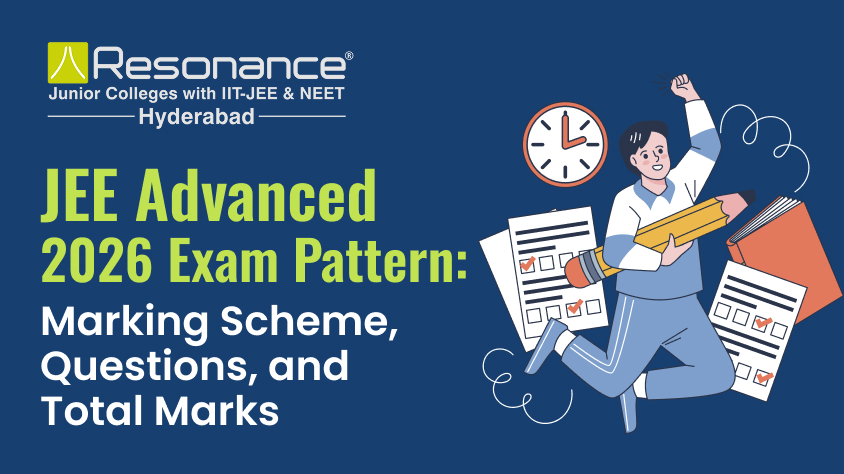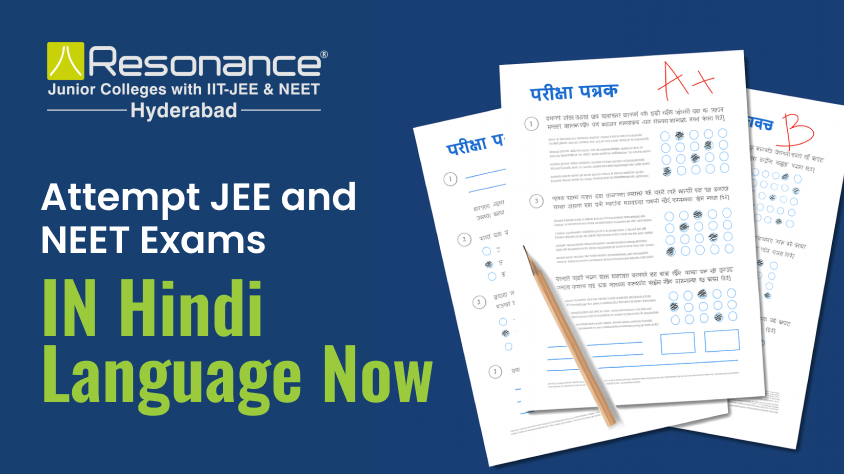- Resonance
- 251 Views
JEE Advanced 2026: Exam Pattern, Marking Scheme, Questions & Total Mar

Every year, one IIT among the 7 zonal IITs conducts the JEE Advanced exam in sequence, and this upcoming year, IIT Roorkee is set to organize the JEE 2026 entrance examination. The seven designated zonal IITs in India are IIT Roorkee, IIT Kharagpur, IIT Delhi, IIT Kanpur, IIT Bombay, IIT Madras, and IIT Guwahati. The Joint Admission Board (JAB) will make an official announcement a few months later, and the examination procedure and the admission process shall be monitored. JAB is also responsible for making decisions on the implementation of policies when required. The details of the exam will be made available on the official website (jeeadv.ac.in) in a few months before the JEE Advanced. However, the JAB will provide comprehensive information on the JEE Advanced 2026 exam and seat allotment based on your obtained rank card at various IITs across the nation. However, the National Testing Agency will provide notification containing complete guidelines from the concerned IIT involved in conducting the JEE Advanced entrance test. IIT Roorkee, a zonal institution, will release comprehensive guidelines according to the calendar dates that include the JEE Advanced 2026 pattern.
NOTE:
In this section, a candidate can view every minute detail of the question paper of the JEE Advanced 2025. The following are the issues that are likely to be picked for discussion, as they are:
Why Has the JEE Advanced Exam Pattern Gained Importance?
Importance of understanding the exam pattern before preparation.
Analyse the Question Paper Pattern.
JEE Advanced 2026 Exam Structure
Subjects Covered in IIT-JEE Advanced Exam Papers
All Subjects are Equally Important in Both Papers
Total Number of Questions in each of Paper 1 & Paper 2: JEE Advanced 2025
JEE Advanced 2025 Exam Papers Analysis
Negative Marking in JEE Advanced 2025 Exam
Subject-wise Question trends in JEE Advanced 2025: Key takeaways
JEE Advanced 2025 - Subject-wise (% of Marks Distribution)
JEE Advanced 2025 (Subject-wise): High-yield Areas of Classes 11th and 12th: Papers 1 & 2
Trend of the JEE Advanced 2025 exam Paper 1 & Paper 2
Preparation Tips Based on Exam Pattern
How to Plan Time for Papers 1 & 2?
Conclusion
Know the Exam Pattern, a Competitive Advantage: A Recap
Why Has the JEE Advanced 2026 Exam Pattern Gained Importance?
IITs are the most prestigious technological institutions, and gaining access to study at an IIT campus can be possible only when you are perfect in every aspect of preparing for the JEE Advanced 2026 exam. Participating in a national-level competition, with a vast Gen Z in a country like India, thousands of students are approaching JEE Advanced to pursue education for excellence, and their participation in JEE Advanced is rising phenomenally. For your reference, the key number analysis reveals that 187,223 candidates sought registration for JEE Advanced 2025, and 180,422 aspirants participated in the exam, which includes paper 01 and paper 02. In which about 30 percent of the participants cleared the nation's toughest exam (JEE Advanced 2025) compared to 2024 results, which were 26.8 percent. A candidate participating in JEE Advanced faces neck-on-neck competition. A small error can make them lose their position in the competitive race. Encountering mistakes or common errors when answering the question papers may reduce their scores, paving the way to colleges other than. Moreover, a candidate is permitted to attempt the IIT-JEE Advanced only twice. If a candidate is not cautious and fails to prepare a planned study for IIT-JEE Advanced, then achieving their dream is impossible.
Importance of understanding the exam pattern before preparation.
A JEE Advanced participant needs to understand the exam pattern, and candidates must check their strengths and weaknesses in solving the question paper. The most crucial element in solving the question paper is the time allotment to different questions, which varies from paper to paper. The JEE papers 1 and 2 are graded as easy, moderate, and tough. Depending on the type of question paper a candidate faces in the examination hall, one must draw a plan and begin to solve the question paper to score high.
Analyse the Question Paper Pattern:
A proper analysis of the exam pattern will let you know how to plan the exam paper, which includes allotment of time for each section of the subject paper.
Understand the type of questions that can be asked through multiple-choice questions, MCQs in Papers 1 and 2.
You must also make a clear note on the type of MCQs that execute negative marking and, if so, how they would be evaluated.
Repeated practice of mock tests can enable candidates to analyse question papers 1 and 2 and continue to follow a well-defined process to score top marks. Therefore, understanding the exam pattern before attempting mock tests is the most important aspect in preparing JEE Advanced question papers.
4. JEE Advanced 2026 Pattern
The JEE Advanced 2026 is a national-level examination conducted by zonal institutions on a rotational basis every year. The JEE Advanced 2026 will be conducted a few months later than JEE Mains. The JEE Advanced 2026 will be conducted on a single day, two papers, 1 and 2, in two assigned shifts. Paper 1 is in the morning shift, and Paper 2 is in the afternoon shift. For JEE Advanced 2026, a candidate must attempt both papers 1 and 2. Candidates who appear for papers 1 and 2 shall be eligible to get screened for IITs across the nation.
Being a national-level examination, the IIT entrance test mode is computer-based and will be conducted at the mentioned examination centers across the Nation. The medium of the entrance examination will be in English and Hindi. The papers 1 and 2 test duration will be 3 hours each, with an extension of one hour for physically challenged candidates, i.e., 4 hours.
Subjects Covered in IIT-JEE Advanced Exam Papers
In the IIT-JEE advanced exam, two papers, Paper 1 and Paper 2, have the same weightage, and each paper will comprise physics, chemistry, and mathematics. Both papers consist of four sections per subject. Each section contains questions with variation in marks assigned according to the question type.
All Subjects are Equally Important in Both Papers:
Both papers, Paper 1 and Paper 2, compose 360 marks, equally distributed in 180 marks per paper. Every subject will contain 16 questions, and each section will have questions with different marks prescribed according to the question type. A candidate can answer multiple-choice questions and mark answers, as per the specifications provided in the instruction page.
Important note:
Candidates who are attempting the question paper may find the prescribed pattern different from the previous year’s pattern. Such variations may occur, but never diverge completely from the main pattern course. There are four types of question patterns, and all four are observed in Paper 1, while in Paper 2, only three patterns are formed. It is in direct reference to the observed patterns in JEE Advanced 2025.
Total Number of Questions in each of Paper 1 & Paper 2: JEE Advanced 2025
In the JEE Advanced 2025 question papers 1 & 2, 48 questions were present in each paper with an equal distribution of marks for every subject. In the previous year, IIT Kanpur released 54 questions per paper, and the number of questions that appeared in Papers 1 and 2 was less than the specified number.
JEE Advanced 2025 Exam Papers Analysis:
In this section, the exam pattern of JEE Advanced 2025 is described to make candidates understand the in-depth significance. A candidate can benefit from the analysis in several ways.
It does explore the recent year’s question paper trends.
Candidates can understand the level of preparation and the topics in depth per subject that are required.
A candidate can make the right choice by allotting proper time in the preparation process.
The presence of negative marking in select sections makes a candidate realize the sensitivity of the questions that are to be attempted.
The high-weightage topics per subject caution a prep candidate about their significance and not to neglect them.
Another factor a candidate must understand is that all subjects are equally important, and all should be performed well for a good score.
“Negative marking is a direct caution for candidates aiming for top scores in the IIT-JEE exam.”
A careful analysis of the JEE Advanced 2025 exam pattern can help candidates plan their study materials and enhance insights into IIT-JEE Advanced preparation.
Negative Marking in JEE Advanced 2025 Exam:
Both papers 1 and 2 have three types of questions in common, and they are as follows.
Each paper includes multiple-choice questions with a single correct option, multiple correct options, and numerical answer types.
The fourth multiple-choice questions differ between the papers. In Paper 1, the fourth type of question includes matching-type questions, while in Paper 2, it is numerical or paragraph type, and matching-type questions are not asked.
S.No | Types of MCQs | Correct Answer | Incorrect Answer (Marks Deducted) | No Answer |
1 | Single MCQs | 3 | 1 | 0 |
2 | Multiple MCQs | 4 | 1, or 2, or 3 | 0 |
3 | Numerical | 3 | 2 | 0 |
4 | Matrix match or Paragraph Type | 3 or 4 | 1 | 0 |
10. Subject-wise Question trends in JEE Advanced 2025:
Key takeaways:
As per the JEE Advanced 2025 exam pattern, topics in various subjects of Classes 11th & 12th are listed as follows:
Important Topics of Class 12th:
In Mathematics, candidates who have focused on topics such as calculus, 3D Geometry, vectors, probability, and matrices can benefit the most.
In Physics, candidates who have focused on topics such as electromagnetism, optics, and modern physics are critical for study.
In Chemistry, candidates who have focused on topics such as organic 11, coordination, and concepts of inorganic chemistry are of significant importance.
Important Topics of Class 11th:
In mathematics, candidates who have focused on topics such as complex numbers, coordinate geometry, conics, trigonometry, sequences, and series can benefit the most.
In physics, candidates who have focused on topics such as Mechanics and Thermal Physics can benefit from the significant ones.
In chemistry, candidates who have focused on topics such as physical and organic chemistry are of greater significance.
11. JEE Advanced 2025 - Subject-wise (% of Marks Distribution):
The combination of questions given in the JEE Advanced from Class 11th and Class 12th relates to the importance of topics in JEE Advanced. The statistical data reveal the percentage of marks a candidate can expect from the first-year and second-year subjects included for the JEE Advanced exam. The tabular column replicates the percentage of marks set for Papers 1 and 2. The candidate can find an approximate % of marks in physics, chemistry, and mathematics, usually displayed in an average:
S.No | Subjects | Class 11th Percentage Subject-wise | Class 12th Percentage Subject-wise | Total Percentage subject-wise |
1 | Physics | 15 | 19 | 34 |
2 | Chemistry | 13 | 18 | 31 |
3 | Mathematics | 17 | 18 | 35 |
| Overall total in percentage | 45 | 55 | 100 |
JEE Advanced 2025 (Subject-wise): High-yield Areas of Classes 11th and 12th: Papers 1 & 2
A candidate can look for topics of high-yield areas for classes 11th and 12th in a subject-wise manner. In Papers 1 and 2, every subject is covered for 120 marks, thus making a total of 360 marks per paper.
S.No | Subjects | Topics ( High-yield ): Per Unit |
1 | Physics | Electricity & Magnetism (16%), Mechanics (40% of Class 11), Modern Physics (12%) |
2 | Chemistry: | Organic Chemistry–II (24%), Physical Chemistry (23% in Class 11), Inorganic (15% Class 11) |
3 | Mathematics | Integral Calculus (20%), Probability (14%), Vectors & 3D (12%), Complex Numbers (10%) |
12. Trend of the JEE Advanced 2025 exam Paper 1 & Paper 2.
In both papers, mathematics is considered the toughest, as the questions demanded high-level calculations and required high conceptual clarity to solve the tricky questions.
Physics can be graded from moderate to difficult. To solve the questions, a candidate required the application of proper conceptual clarity and numerical involved laborious steps.
Chemistry was easier when compared to physics and mathematics, and was held as the most scoring subject in both papers, 1 & 2.
13. Preparation Tips Based on Exam Pattern
Every year, a particular institution that is involved in conducting the JEE Advanced exam provides the examination pattern in detail. From that, a candidate can plan meticulously for the examination. However, a candidate may have planned and worked hard, and still, certain issues when preparing for the exam should be taken into consideration. The prime question is how to allot time for both papers when the time between JEE Mains and JEE Advanced is too short.
14. How to Plan Time for JEE Advanced (Papers 1 & 2)?
A candidate must check the percentage of subjects that are covered in IIT and JEE Mains from Classes 11 and 12.
Although the class-12th candidate is engaged in preparing for their board exams, a little time must be utilised for the Class 11th syllabus and Class 12th’s JEE Advanced syllabus for revisions.
The candidate must approach the final revision for Paper 2 by utilizing a cue card for Paper 2.
Practice the mock tests for Paper 1 and Paper 2 by maintaining the right balance between the two papers.
The candidate must concentrate on high-priority topics in mock tests for Papers 1 and 2.
When a candidate practices different question types repeatedly, they can tackle the tricky questions by taking less time.
More importantly, a candidate must attempt questions of varying types, and in a difficult question, they can realize the optimal time spent. This will help the candidate improve time management in the final exams of JEE Advanced.
15. Conclusion
Gaining comprehensive knowledge about exam patterns enables the candidate to prepare strategies for exam preparation, in which practicing mock tests is highly essential. A candidate can easily understand when preparing for the JEE Advanced 2026 exam, the primary essentials required to solve the various types of questions. Negative marking with wrong answers is the most damaging part of the exam, as any wrong move can trail the score. The information above will guide candidates to perform their best in the JEE Advanced exam, as the JEE Advanced 2026 pattern bears significance.
16. Know the JEE Advanced 2026 Pattern, a Competitive Advantage: A Recap
Bear in mind that the high-weightage topics in subjects are the most significant information that are to be mastered at the beginning of the JEE Advanced preparation.
A candidate must practice the mock tests regularly and should never forget to concentrate on the strengths and weaknesses when solving the numerical or conceptual questions.
The JEE Advanced 2025 exam paper comprises multiple-choice questions that are based on conceptual thinking and numericals.
. Bear in mind that never attempt questions with guesswork, as the candidate can get into the trap of negative marking.
However, to succeed in a national-level exam, a candidate must put in tremendous effort by starting with understanding the exam pattern. It is one of the significant factors contributing to the success in JEE Advanced 2026.
JEE Advanced 2026 Exams: FAQs
What Is the Maximum Mark in JEE Advanced 2026?
The raw score in JEE Advanced 2025 is 360 marks, which is a combination of Paper 1 (180 marks) and Paper 2 (180 marks).
In 2025, the JEE Advanced’s top score was 332 out of 360, which is amazingly high.
Is Negative Marking Applicable in JEE Advanced 2026?
Four types of questions are given in the IIT-JEE Advanced 2026 exam. The question types are single-correct MCQs, multiple-correct MCQs, numerical-value-type questions, and matric-matches or paragraph-type questions. To understand the negative marking in the JEE Advanced exam 2026, you must follow the data presented in the parentheses.
In MCQs ( Type : Correct Answer: Incorrect Answer : Not Answered) : ( Single MCQs : +3 Marks : +1 Marks : 0) (Multiple MCQs : +4 Marks : +1, +2, +3 As per the correct options selected) ( Numerical Value Type : +3 Marks : 0 : -2 Marks) (Matrix Match or Paragraph Type: +3 or +4 marks : -1 marks)
3. Can I skip Paper 1 or Paper 2 in JEE Advanced 2026?
In the IIT-JEE Advanced exam, the total number of marks obtained by answering 108 questions defines the rank in IIT. If a candidate skips any of the papers, they will be ineligible to qualify for JEE Advanced.
4. Who is eligible to appear for JEE Advanced 2026?
A candidate who has competed for the JEE Mains exam and obtained above the cutoff, which is dependent on the reservation category.
5. How Many Attempts Are Allowed for JEE Advanced?
Any candidate is eligible to attempt for two consecutive years. The first attempt will be after class 12th, and the next attempt in the succeeding year.
6. What is the Difference Between JEE Main and JEE Advanced?
JEE Advanced is the extension of the JEE Mains examination. Candidates who qualify in JEE Main as per the predefined rules are eligible to attempt JEE Advanced. Those who score top marks will have the opportunity to join any of the leading premier institutions listed in the 23 IITs.
7. What is the syllabus for JEE Advanced 2026? Is it different from JEE Main?
In every subject, maths, physics, and chemistry, students will need to develop in-depth skills essential to crack tough problems. The syllabus of JEE Advanced 2026 will be covered in depth compared to JEE Mains. Year on year, NTA releases a topic-wise syllabus for every subject.
8. Does JEE Advanced 2026 include numerical or integer-based questions?
Yes, numerical questions are a part of the JEE Advanced question papers. The answers to such questions will be integers, and they will not be a part of the multiple-choice questions.
9. What is the duration of each paper in JEE Advanced 2026?
In JEE Advanced 2026, two exam papers, 1 & 2, are conducted in the morning and afternoon sessions. The duration of each paper is 3 hours, and it shall be extended to 4 hours for any physically handicapped candidate.
10. How many questions are asked in JEE Advanced 2026 overall?
JEE Advanced papers 1 & 2 will comprise 108 questions, and each paper will have 54 questions.
11. Do the JEE Advanced Papers Conduct Negative Marking?
Marking can be defined for three broadly classified categories: Single correct MCQs, multiple correct MCQs, and Numerical or paragraph-type questions. Except for numerical questions, the other two types of MCQs do attract negative marking. However, a JEE Advanced aspirant must read the instructions of the question paper attentively to identify the changes in marking, if any.













